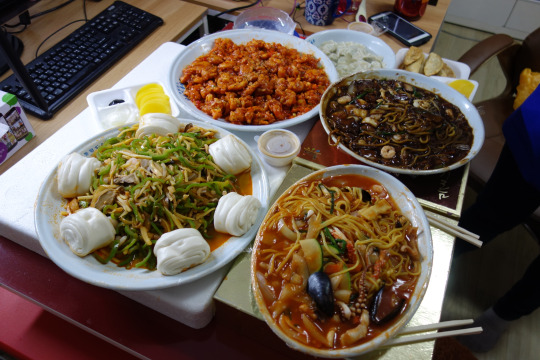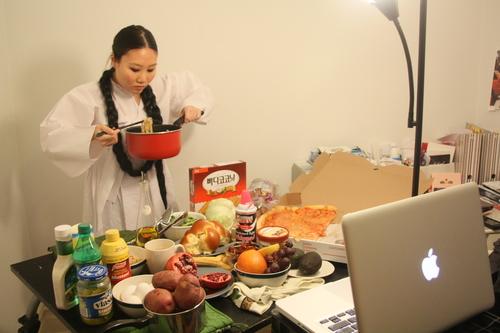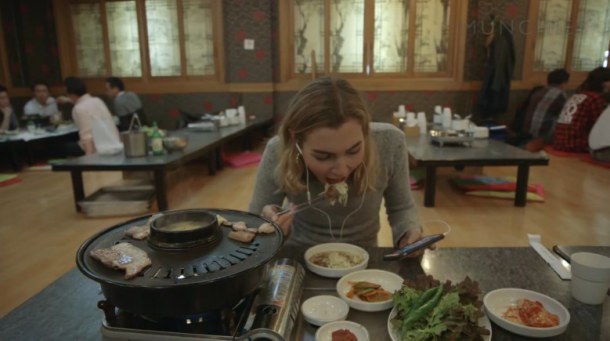If you haven’t already read Spoon University at Pittsburgh’s article on Mukbang, I highly suggest you do.

Photo courtesy of tumblr.com
Essentially, “Mukbang” is a phenomenon where people livestream themselves eating large quantities of food, and rollin’ in the cash while they’re at it. These Mukbang broadcast journalists, or “BJs,” get paid by donation from their fans to “passionately eat” in front of their livestreaming camera.
It’s become such a big trend that some have turned it into a full time job. Just like many western YouTubers and Instagrammers, a select few of these “BJs” have become celebrities for what they do.
If you look into the deep dark world of the internet, then you will see that trends like Mukbang are not new. An example is the English breakfast challenge which is also just people eating a buttload of food and posting a video to the internet. If you’re still not convinced you could’ve just turned on any TV in America on the fourth of July and watch records being broken in the “world famous” hot-dog eating contest (shoutout to Matt Stonie.)
What is it about this trend that is so fascinating? More importantly why do we glorify eating very large quantities of food, similar to what is known as binge eating? This is what I came up with.
It’s a lonely world out there.

Photo courtesy of florachoi.com
One of the reasons people think Mukbang is becoming so popular in South Korea is because more people are living on their own and are growing lonely. Apparently, Mukbang is a way to not be lonely while eating. In reality, the people watching it are just eating and watching someone consume an insane amount of food at once.
Not only could this be an unhealthy habit for the BJ, but this could potentially have a negative effect on the viewer’s waistline. I may or may not be speaking from experience but I think we’ve all had those times where you buy the biggest barrel of popcorn the movie theater offers and then you look down at it after the first 15 minutes of previews and at least half of it is gone.
Yeah. That’s a thing. It’s also why my mom never let me eat dinner in front of the TV. When you eat in front of a screen you end up eating more because you’re not thinking about exactly how much you’re eating. Also the reason why you think you really need the largest barrel of popcorn for a movie.

Photo courtesy of retrenders.com
Just as some believe the obsession with instagramming or posting pictures of food online has become a problem leading to anorexia and similar disorders, like orthorexia, this trend could lead to the glorification and normalization of binge eating.
Although there is no real insight on what these people’s lifestyles are like while not on livestream, this trend clearly poses a lot of health risks.
In the mini movie “The Food Porn Superstars of South Korea” by Munchies one of the celebrity “BJs” even said the one major downside to this new job is the amount of weight he has gained since he started.
Striving for the improbable.
Eating disorders have become a growing problem in South Korea. This is largely blamed on the Asian pop culture boom. People are striving more and more to look like their favorite stars in the media. But people are also blaming it on the desire to live a more western lifestyle.
South Korea has become the “plastic surgery capital” of the world with more surgeries per capita than the US and Brazil. People have become so conscious about themselves and their body that they focus most of their lives on dieting (which is basically just not eating.)
What’chu talkin’ bout?

GIF courtesy of giphy.com
The Mukbang trend is a truly fascinating and eye opening trend. It might just be me, but I think that society has put an emphasis on food more than ever. We’re striving to be healthy but we also need to have that new fancy doughnut that was invented by some dude in the city or try that new flavor of ice cream that has 5 different types of cookie dough.
For some, food is about quantity over quality, and eating is a competition. In my opinion the point of food is nourishment, and enjoyment, not about how much you can eat. I have strong beliefs that you can have all you want, as long as you respect it and have it in moderation.


